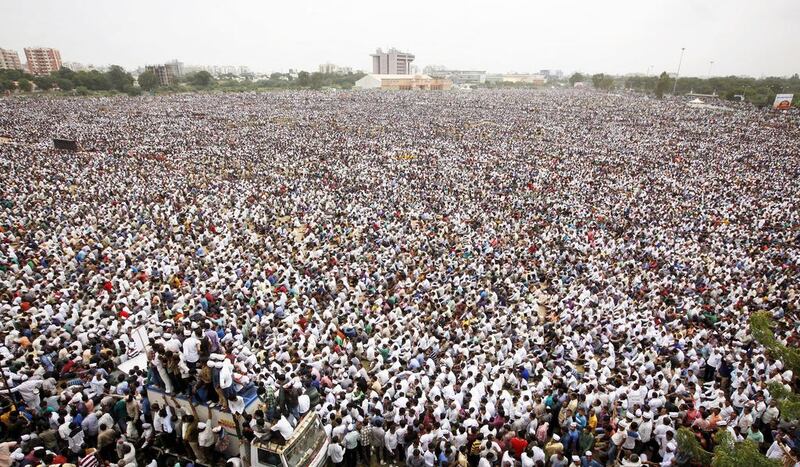NEW DELHI // The Indian state of Gujarat was rocked by violence for a second straight day on Wednesday, as security forces tried to quell protests by the large Patel community who is demanding reserved quotas in education and government employment.
Even as schools and colleges were shut down through Wednesday, Patel protesters – who claim to be socially disadvantaged – stopped trains, vandalised government buildings, and set buses and other vehicles on fire.
On Wednesday morning, prime minister Narendra Modi’s government rushed 5,000 paramilitary troops to Gujarat to deal with the violence. Mr Modi, himself a Gujarati, issued a televised appeal for peace.
“Violence will not benefit anyone,” he said. “We can find a solution through talks.”
The violence began on Tuesday, when the leader of the weeks-long protests, 22-year-old Hardik Patel, was briefly detained by police before being released.
Patel protesters have been holding demonstrations since mid-July, but matters came to a head on Tuesday evening, when Mr Patel addressed a half-million-strong rally.
“If you do not give us our right, we will snatch it,” Mr Patel said, demanding that the community be classified by the government as an Other Backword Class (OBC), making it eligible for affirmative action.
“Whoever will talk of Patel interests will rule over Patels. Why have we come to the streets now? It is because our own don’t care for us although they are in power,” he added, referring to Gujarat’s chief minister Anandiben Patel.
Despite the authorities imposing a nightlong curfew in some areas of the state, incidents of arson and stone-throwing continued late into the night on Tuesday. Three people died in the clashes.
The OBCs, defined constitutionally as “socially and educationally backward classes”, include thousands of castes across India who have been historically disadvantaged. Indian policy reserves 27 per cent of seats in higher education institutes and jobs in government employment for these castes across the country.
But the process of adding a new caste to this category is fraught with complexities. Government-appointed commissions study the socio-economic background of the caste – ideally insulated from political pressure – and make recommendations.
On top of this, is the fact that other castes and tribes aside from OBCs are also eligible for affirmative action, while the supreme court does not allow reserved quotas for more than 50 per cent of total available university seats or government jobs.
In Gujarat, other classifications of castes and tribes already have reserved quotes, all of which add up to 49.5 per cent.
The Patels are traditionally a caste of farmers and landowners, found primarily in Gujarat but also – under different names – in six other states in India.
Mr Patel, in his speech on Tuesday, claimed that India’s Patels numbered 270 million, but there are no official government statistics to corroborate this.
In Gujarat, where Patels constitute roughly between 15 and 20 per cent of the 63-million-strong population, they continue to own large tracts of land. They also dominate the dairy, textile and diamond processing industries.
Meanwhile, Patels who have emigrated to the United States and Europe are among the wealthiest communities there. In the US, they are particularly known for their hold on the motel industry, where one in four motels is owned by a Patel.
More than a quarter of the 182 legislators in the Gujarat assembly are also Patels. The state itself, since it was created in 1960, has been ruled by three Patel chief ministers.
But Mr Patel has insisted that the fortunes of millions of small Patel entrepreneurs have declined, and that they are being left behind because of reservations for other castes and classes.
A Patel student scoring 90 per cent in his exams is unable to get into a medical college, Mr Patel has said, even though other OBC students are able to gain admission into their reserved seats by scoring just 45 per cent.
Mr Patel himself is something of an enigma. After graduating with a degree in commerce three years ago, he briefly ran a business supplying water to industries and commercial establishments.
He quit, however, to lead and work full time with the Patidar Anamat Andolan Samiti, a group that champions the rights of Patels.
Wearing jeans and sporting a scrubby moustache, Mr Patel is an unlikely leader. He frequently allows himself to be photographed holding a gun, to signal that he is not afraid to choose an incendiary path to achieve his objectives.
"He's tapping into some vein of anger within the community, and no one has been able to figure out precisely why this anger exists," a Bharatiya Janata Party (BJP) leader in Gujarat told The National on Wednesday.
“Perhaps it’s a sign that some of the traditional sources of wealth for Patels, like agriculture are being eroded, and they’re looking for other means of livelihood,” he said. “Whatever it is, it has made the establishment really jittery.”
ssubramanian@thenational.ae





